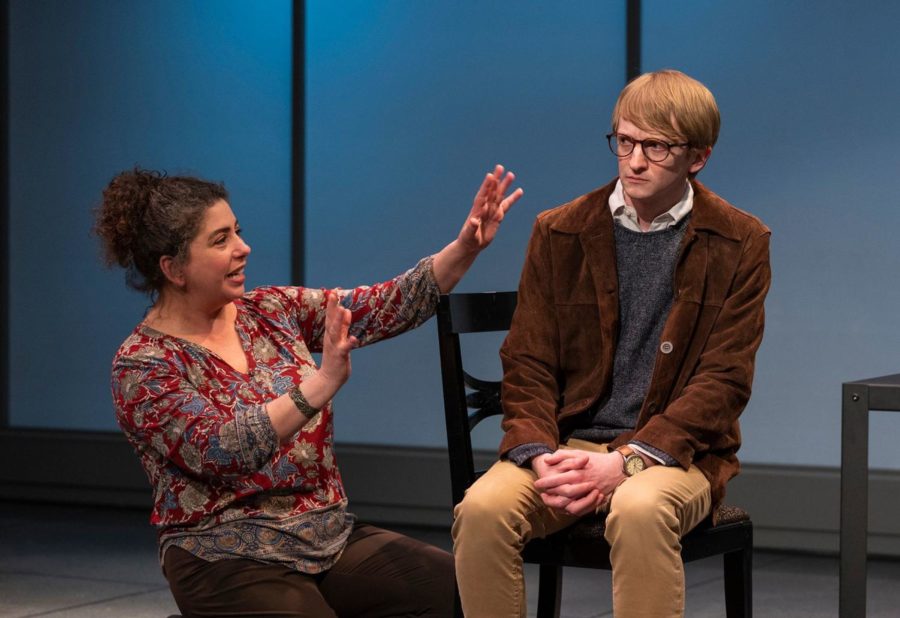In Edgewater Glen, Chicago, Raven Theatre’s production of Sharyn Rothstein’s Right To Be Forgotten is powerful, touching, and opportune. The play, which premiered in Washington, D.C. four years ago, follows Derril Lark, a painfully awkward 20-something literature student, as he brings suit against big tech for internet privacy violations. Ten years ago, Lark stalked a high school classmate he barely knew—something the play is, thankfully, morally unequivocal about. After going to said classmate and apologizing to her, Lark desires the ability to take down online mentions of his past faults. This is not, however, a play about forgiveness, so much as it is a play about the internet’s ability to contort real life and preserve those distortions.
That we should have more of our conversations in person is hardly a novel aspect of the current zeitgeist—where Right To Be Forgotten excels is that it rarely says this aloud and only tangentially shows it. At times, Rothstein’s dialogue surrounding free speech is a touch too showy, though many of the drama’s lines are more poignant—Lark’s musings on renaming himself, especially. Asked by his lawyer why he didn’t simply change his name, he remarks, “If I could be anyone, I could just as easily be no one.” The play’s title is somewhat of a misnomer; Lark is not so much fighting to be forgotten as he is struggling to be remembered differently.
And, past a few nonsense lines—lines like “the Internet is us… it’s me”—Right To Be Forgotten’s dialogue is gratifyingly realistic. Where this play flourishes is in its portrayal of significant social debates through the lens of individual interactions. Right To Be Forgotten practices what it preaches: we should focus more on human interaction and less on corporate talking points and labels such as “pro–free speech.”
Such a focus works only with a strong cast, and Right To Be Forgotten delivers on that front. In particular, Adam Shalzi as Lark and Susaan Jamshidi as his lawyer, Marta Lee, shine. Lark is a difficult character to portray, but Shalzi plays him with just the right balance of sympathy and scrutiny. Crucially, Shalzi also leans into Lark’s nerdiness without making it a joke, a crutch, or, worst of all, a caricature. His shoulders, his tone, his expending of energy—all are part of a character who feels authentic and lived in. Jamshidi’s Lee is even more genuine in her emotion. She is a woman driven by an outré desire for a combination of performative accomplishment and genuine triumph, accompanied consistently by a flamboyant apathy toward how she is perceived. She exists onstage loudly, heavily, ostentatiously, joyously, and at times carelessly. The genuine quasi-friendship that forms between Lee and Lark—the former a loner by choice, the latter through ostracism—is sensitive and charming.
In supporting roles, Kelsey Elyse Rodriguez is amusing and cheerful as Lark’s (non-stalked) romantic interest Sarita; Lucy Carapetyan, despite some exaggerated delivery, lends much-needed humanity to the anti-privacy argument as corporate lawyer Annie Zahirovic. It is also only through onstage interactions between Zahirovic and Lee that Lee’s character is fully expanded and expressed.
If Raven Theatre’s Right To Be Forgotten has a weakness, it is that the stage design, though creative, falls just short and hampers the play’s message. Credit should be given to Director Sarah Gitenstein and Scenic Designer Jeffrey D. Kmiec for taking a serious risk in placing Right To Be Forgotten’s subdued plot on a massive stage. In the scenes when Gitenstein and Kmiec stick to such a conceptualization—two or three characters at a small table in the corner of a large, mostly unlit stage—the effect is one of startling isolation, but too frequently, such direction is compromised by actors placed center stage or blocked to traverse the stage. Then, honestly, the stage’s size is merely annoying.
The aforementioned massive, generally empty stage is ringed by a series of large floor-to-ceiling screens, which scroll through expository tweets, blog posts, and the like during scene transitions. It’s an interesting idea, and one of the better uses of screens I’ve seen in a play; however, the screens are so constant that they are not only overwhelming in their stream of information, but also distracting in their flashing and scrolling. To get slightly meta, perhaps Raven Theatre wants to remind the audience that screens are distracting, but what they’ve really done is fall culprit to distracting the audience themselves.
What they’re distracting from is a series of powerful, well-acted scenes complemented by sharp visual design. A checkerboard of troffer lights boxes the stage in from above, creating the effect of both spotlighting and depressing the action. Finnegan Chu’s costume design is drab enough to be realistic, but funky enough to entertain—Lee’s floral blouses in particular are equal parts appropriate and absurd.
Right To Be Forgotten succeeds, as a whole, in humanizing ideas that are inherently difficult to empathize with. And yes, perhaps avoiding the traps of impersonality is as difficult as Right To Be Forgotten suggests; Raven Theatre themselves at times fall prey to the allure of stilted language and technological capacity. By the play’s end, though, what’s clear is that Right To Be Forgotten has at the very least tried diligently and innovatively to restore personal connection to a COVID-altered world. Where the play failed to fully do so, well, often so do we.
Raven Theatre’s production of Sharyn Rothstein’s Right To Be Forgotten is in Edgewater Glen through March 26th.








